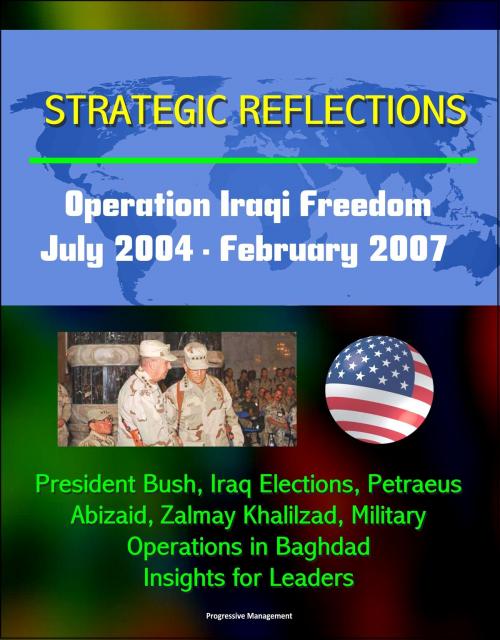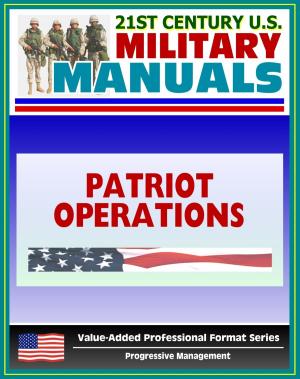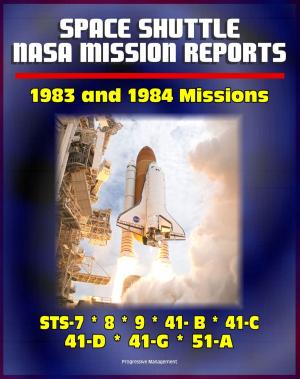Strategic Reflections: Operation Iraqi Freedom, July 2004 - February 2007 - President Bush, Iraq Elections, Petraeus, Abizaid, Zalmay Khalilzad, Military Operations in Baghdad, Insights for Leaders
Nonfiction, History, Military| Author: | Progressive Management | ISBN: | 9781310410253 |
| Publisher: | Progressive Management | Publication: | November 25, 2014 |
| Imprint: | Smashwords Edition | Language: | English |
| Author: | Progressive Management |
| ISBN: | 9781310410253 |
| Publisher: | Progressive Management |
| Publication: | November 25, 2014 |
| Imprint: | Smashwords Edition |
| Language: | English |
Author General Casey writes: Operations Enduring Freedom and Iraqi Freedom were the first major wars of the 21st century. They will not be the last. They have significantly impacted how our government and military think about prosecuting wars. They will have a generational impact on the U.S. military, as its future leaders, particularly those in the ground forces, will for decades be men and women who served in Iraq and Afghanistan. I believe it is imperative that leaders at all levels, both military and civilian, share their experiences to ensure that we, as a military and as a country, gain appropriate insights for the future.
As the Army chief of staff, I encouraged leaders at the war colleges, staff colleges, and advanced courses to write about what they did in Iraq and Afghanistan so that others could be better prepared when they faced similar challenges. This book is my effort to follow my own advice. I believe that we have not seen the last of the challenges and demands that I faced during my 32 months of combined command in Iraq, and I offer these insights so that future leaders can be better prepared.
During my command tenure, the Multi-National Force-Iraq (MNF-I) mission transitioned from one of occupation to one of partnership with three Iraqi governments. We used this period to lay the foundation for and begin the transition to a self-reliant Iraqi government, our mandate from the United Nations (UN). This book primarily addresses the events, decisions, and actions of MNF-I as I perceived them at the time. I have occasionally offered retrospective insights that come from experience and hindsight, but I felt it is more important to focus on what I thought and what I did then to provide the best insight into the challenges I faced and how I dealt with them. It reflects my insights as a commander in one theater of a broader war.
In preparing this book, I relied on the historical records that I kept from Iraq—personal notes, briefings, plans, assessments, meeting notes — that, while decidedly incomplete, greatly sharpened my personal recollections and offered insights into how we viewed the situation over time and what we conveyed to our political leaders. They are available for research at the National Defense University.
Chapter 1 - Preparing for the Mission (May-June 2004) * Framing the Mission * Building a Key Relationship * Consultations and Direction * Direct Insights * Confirmation * Chapter 2 - Establishing the Mission and Preparing for the First Elections (July 2004-January 2005) * Organizing for Success * Military Operations * Election Planning and Preparation * Looking Beyond the Elections * The First Elections: January 30, 2005 * Chapter 3 - Completing the UN Timeline and Setting Conditions for a New Iraq (January-December 2005) * Adapting in Transition * Completing the UN Timeline * Chapter 4 - Government Transition and the Rise of Sectarian Violence (January-June 2006) * Government Transition * The Samarra Bombing and Its Aftermath * Building New Partnerships * Camp David and June D.C. Consultations * Chapter 5 - The Toughest Days (July 2006-February 2007) * Adjusting the Plan * Civil-Military Relations * Military Operations in Baghdad * Washington Policy Review * Chapter 6 - Insights for Leaders * Developing Vision and Strategy * Creating Unity of Effort * Continuous Assessment and Adaptation * Influencing Organizational Culture * Civil-Military Interaction * Political-Military Integration * Momentum and Transitions * Sustaining Yourself
Author General Casey writes: Operations Enduring Freedom and Iraqi Freedom were the first major wars of the 21st century. They will not be the last. They have significantly impacted how our government and military think about prosecuting wars. They will have a generational impact on the U.S. military, as its future leaders, particularly those in the ground forces, will for decades be men and women who served in Iraq and Afghanistan. I believe it is imperative that leaders at all levels, both military and civilian, share their experiences to ensure that we, as a military and as a country, gain appropriate insights for the future.
As the Army chief of staff, I encouraged leaders at the war colleges, staff colleges, and advanced courses to write about what they did in Iraq and Afghanistan so that others could be better prepared when they faced similar challenges. This book is my effort to follow my own advice. I believe that we have not seen the last of the challenges and demands that I faced during my 32 months of combined command in Iraq, and I offer these insights so that future leaders can be better prepared.
During my command tenure, the Multi-National Force-Iraq (MNF-I) mission transitioned from one of occupation to one of partnership with three Iraqi governments. We used this period to lay the foundation for and begin the transition to a self-reliant Iraqi government, our mandate from the United Nations (UN). This book primarily addresses the events, decisions, and actions of MNF-I as I perceived them at the time. I have occasionally offered retrospective insights that come from experience and hindsight, but I felt it is more important to focus on what I thought and what I did then to provide the best insight into the challenges I faced and how I dealt with them. It reflects my insights as a commander in one theater of a broader war.
In preparing this book, I relied on the historical records that I kept from Iraq—personal notes, briefings, plans, assessments, meeting notes — that, while decidedly incomplete, greatly sharpened my personal recollections and offered insights into how we viewed the situation over time and what we conveyed to our political leaders. They are available for research at the National Defense University.
Chapter 1 - Preparing for the Mission (May-June 2004) * Framing the Mission * Building a Key Relationship * Consultations and Direction * Direct Insights * Confirmation * Chapter 2 - Establishing the Mission and Preparing for the First Elections (July 2004-January 2005) * Organizing for Success * Military Operations * Election Planning and Preparation * Looking Beyond the Elections * The First Elections: January 30, 2005 * Chapter 3 - Completing the UN Timeline and Setting Conditions for a New Iraq (January-December 2005) * Adapting in Transition * Completing the UN Timeline * Chapter 4 - Government Transition and the Rise of Sectarian Violence (January-June 2006) * Government Transition * The Samarra Bombing and Its Aftermath * Building New Partnerships * Camp David and June D.C. Consultations * Chapter 5 - The Toughest Days (July 2006-February 2007) * Adjusting the Plan * Civil-Military Relations * Military Operations in Baghdad * Washington Policy Review * Chapter 6 - Insights for Leaders * Developing Vision and Strategy * Creating Unity of Effort * Continuous Assessment and Adaptation * Influencing Organizational Culture * Civil-Military Interaction * Political-Military Integration * Momentum and Transitions * Sustaining Yourself















